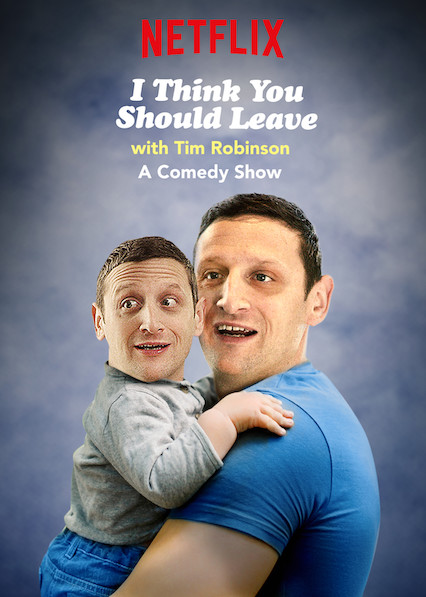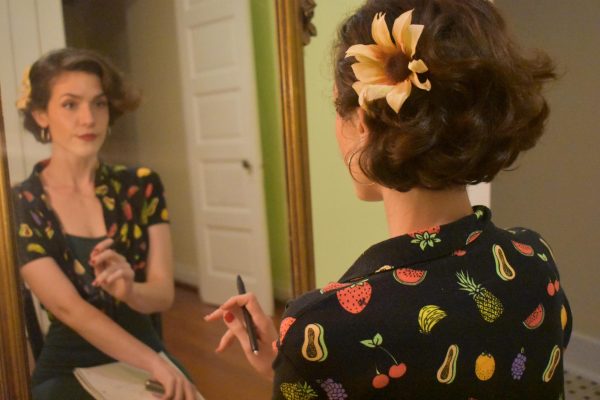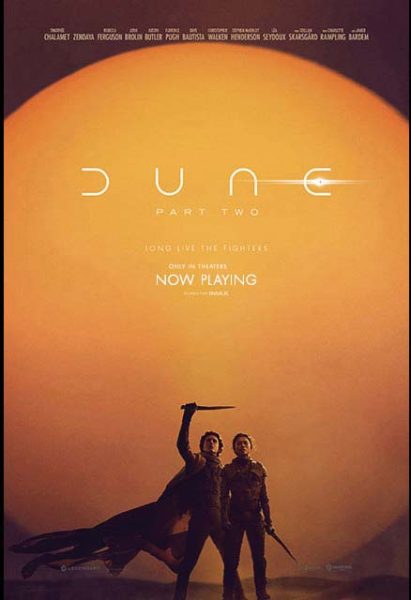Review: “I Think You Should Leave” and the Horror Manifesto Masterpiece Theory

Courtesy of Netflix
To the uninitiated, the Netflix sketch comedy show “I Think You Should Leave” may be a bizarre and unquestionably insane show. Co-created, written, produced, and starring Tim Robinson, it is a brilliant, multi-layered commentary of modern society presented through increasingly bizarre incidents, which upon closer examination leaves the viewer stunned at the brilliance of conveying an intelligent concept through a silly premise.
To fully appreciate the genius of its second and latest season, one must first understand the genius of season one. The show’s main focus is modern corporate society, with the very first sketch of the series featuring a man leaving an interview in a coffee shop trying to rip a “push” door off its hinges after incorrectly assuming it’s a pull door, while politely insisting “it goes both ways.” After watching season two, this sketch feels much more like a thesis statement for the show, as it showcases Robinson as a weirdly aggressive oddball doing something incredibly disruptive while other normal people try to conduct business as usual.
The show’s central dramatic question seems to be how far can Robinson’s maniac of a character push the boundaries of what is acceptable in polite society before someone says: “I think you should leave.” Season one does a lot with this premise by creating instantly iconic sketches like the “hotdog man” sketch: a man dressed in a hotdog costume crashes his hotdog car into a fancy store, then amidst the confusion of the incident tries to act like he has no clue who did it, going so far as to say “We’re all trying to find the guy who did this!”
That quote became somewhat popular on Twitter, with congresswoman Ilhan Omar even responding to ExxonMobil’s announcement that they would be joining the Oil and Gas Climate Initiative with a screenshot of the hotdog man saying the catchphrase. Of course, that’s just a funny coincidence, right? Surely the writers of “I Think You Should Leave” didn’t intend for a silly sketch about a hotdog man to be a metaphor about politics? Right? Wrong. Get ready. Because you’re about to see just how far this rabbit hole goes.
My suspicion that perhaps “I Think You Should Leave” could be something deeper than it lets on did not begin until I started watching season two. Another hotdog sketch features a man trying to eat a hotdog during a meeting after lunch got pushed back. A funny coincidence. Probably. The hotdog is probably not some deep-rooted metaphor for unignorable problems that deranged men are trying to convince us can be easily ignored. Probably. Except this time the whole sketch is predicated on the idea of a corporation making its employees skip lunch, and ends with Robinson saying: “You can’t skip lunch. You just can’t, guys.” If Leon Trotsky had a sketch comedy show, it’d probably look like this. Silly and innocuous at first, but slowly and subtly over time becoming a dark platform to decry a broken world.
The darkness and political edge of season two slowly becomes, quite frankly, frightening. A sketch titled “Little Buff Boys” is a hilarious sketch, but within the context of the real world it becomes much darker. The sketch sees a CEO being brought onstage at an event in front of all his employees and forced to pick the most attractive child as part of a “corporate retreat comedy show” that quickly turns incredibly serious. The music cuts out as the CEO sweats, thinking maybe someone has caught on to him. Maybe that’s why this is happening? Do they know? Think about how powerful “little buff boys” would be if a politician accused of pedophilia was in that chair onstage, on live television? That would be the biggest news event of the year.
Every single sketch in this show is either an articulation of frustration with the modern corporate climate, an exaggeration of a modern cultural problem, or some sort of metaphor for a current problem in society. Oftentimes, the sketch will subtly reference what it’s a metaphor for before the absurdity begins. For example, a sketch about a man who regrets his restaurant order, begs for a friend’s order until he is offered a bite, and then eats it entirely is a metaphor for tech companies wanting your data. It directly references the idea that your phone spies on you and takes your data before the friend says “Hey, I’ve got nothing to hide” and his burger is quickly swiped from his plate.
But what gives it away? What’s the missing piece that definitively proves that the writers of this series are so clever and self-aware that every hidden meaning I’ve said has to be there on purpose? What sketch is so damning that there’s no way it’s not 110% intentional? One sketch that makes everything else click into place is the sketch with the “sloppy steaks guy,” inspired by Hollywood filmmaker Max Landis who was accused of emotional and sexual abuse in 2019, according to Vanity Fair. Landis has recently reemerged on the Internet claiming that he’s changed, with extremely lengthy Instagram posts detailing his interactions with random people on the street in the exact same unsettling way that the main character does in the sketch. They both talk a lot about how they KNOW they used to be “a huge piece of shit” but that they’ve changed, and to imply otherwise wouldn’t really be fair to them.
Watching the sketch, I immediately realized that the character was supposed to be Landis. The main character even has a whole point about his hair being “pushed back instead of slicked back,” no doubt a reference to Landis’s own varied hairstyle history. The accuracy with which this sketch parodies Landis is so precise, it could only have been crafted by someone who deliberately sat down thinking: “How can we make fun of Max Landis?” If they’re thinking that, then they’re a lot more deliberate than a couple of people who sat around and thought “hot dog funny.”
All of this evidence leads me to believe that “I Think You Should Leave” has always been planned as a three-season arc. Season one would be a bizarre silly comedy with some dark moments, but none that ever demanded a second thought. Season two would be a bit darker, a bit more ideologically driven, a bit more bizarre, and a bit more frightening. For season two’s tone shift to have happened, it would have had to be planned.
Season two is definitely not the show Netflix ordered. It is tonally distinct to a degree that it simply had to be planned. Even if it was decided there should be a tonal shift after season one was complete, there had to be a creative meeting where it was decided that season 2 would be what it was. And if the show continues this trend of increasingly unsettling incidents, what can we look forward to in season 3?
Click here to stream season two of “I Think You Should Leave” on Netflix.











